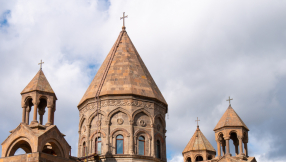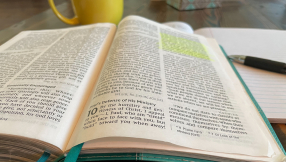Sometimes the mask slips and the church's tormentors reveal their true agenda. This has happened in China, where officials reportedly erased the First Commandment from a church's wall. To remind readers: that's the one that says, 'You shall have no other gods before me.'
Let's be clear what that action means. It says categorically that the state is supreme, and not God. It goes along with China's moves against churches and against Muslims, and its policy of 'sinicising' religion.
Those officials see very clearly that if believers are allowed to proclaim the lordship of Christ, their ultimate loyalty cannot be to the state.
What we are seeing in the 21st century is what God's people have seen for millennia. The Chinese state is Nebuchadnezzar, demanding that Shadrach, Meschach and Abednego worship only him. It's Darius, demanding the same of Daniel. It's Antiochus Epiphanes, sacrificing a pig in the Temple at Jerusalem. It's Caesar – any one of a number of Caesars – requiring Christians to choose between sacrificing to him and martyrdom. And if anyone baulks at the comparison on the grounds that China is a modern country and a valuable Western trading partner, think of the million Muslim Uighurs detained in 're-education centres' and what that means for democracy.
However: the call for religious liberty is not just special pleading for religious people as a special interest group. Religious liberty – including the freedom not to believe – is foundational for all liberties. It is the ultimate assertion that the state does not control conscience, and that no political system can claim our absolute allegiance. That applies to Western democracies as well as Eastern totalitarianisms: flags and faiths do not belong together.
In his prophetic book Nineteen Eighty-Four, George Orwell imagines a future in which the state is in complete control. In a searing line, he says: 'History has stopped. Nothing exists except an endless present in which the Party is always right.'
And in a chilling image, Winston Smith's torturer O'Brien tells him: 'If you want a picture of the future, imagine a boot stamping on a human face – for ever.'
The knowledge of what happens when the state usurps the authority of God himself is buried deep in the DNA of believers. We've seen the results too often in the 20th century. It's what drives us to resist when we think the state is encroaching on our religious rights. Sometimes we're right to do so; often we're over-sensitive, choosing the wrong hill to die on and looking small, narrow-minded and stupid as a result. But the instinct is sound: we'll happily render to Caesar what belongs to Caesar, but we must be allowed to render to God what belongs to God. If we can't always tell the difference very easily, that's because in the liberal West we are largely accommodated.
But believers in China are coming face to face with a stark choice. The state is drawing a line and asking them to decide which side they're on. God's people have been there before, and the blood of the martyrs is the seed of the church. But there can be no compromise: there are 10 commandments, not nine, and the first is the foundation of all the rest.
Follow Mark Woods on Twitter: @RevMarkWoods













